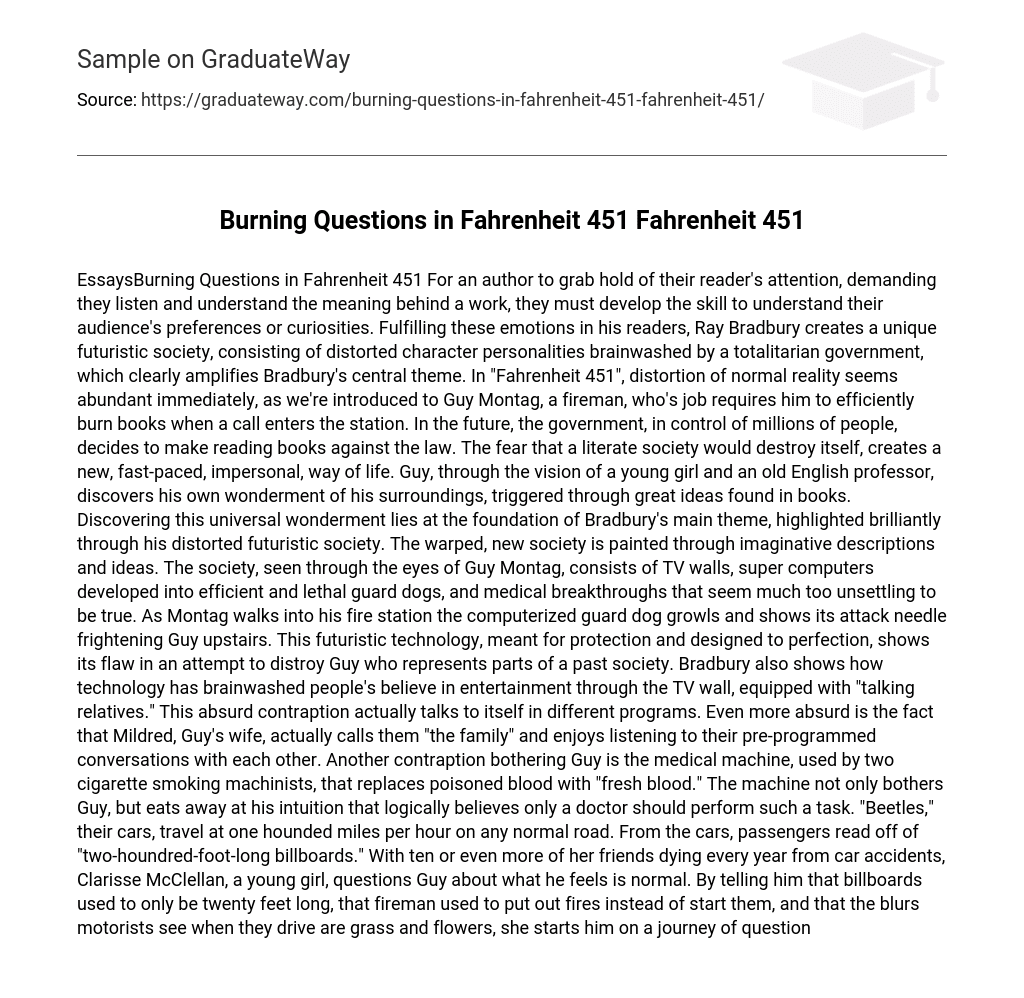EssaysBurning Questions in Fahrenheit 451 For an author to grab hold of their reader’s attention, demanding they listen and understand the meaning behind a work, they must develop the skill to understand their audience’s preferences or curiosities. Fulfilling these emotions in his readers, Ray Bradbury creates a unique futuristic society, consisting of distorted character personalities brainwashed by a totalitarian government, which clearly amplifies Bradbury’s central theme. In “Fahrenheit 451”, distortion of normal reality seems abundant immediately, as we’re introduced to Guy Montag, a fireman, who’s job requires him to efficiently burn books when a call enters the station.
In the future, the government, in control of millions of people, decides to make reading books against the law. The fear that a literate society would destroy itself, creates a new, fast-paced, impersonal, way of life. Guy, through the vision of a young girl and an old English professor, discovers his own wonderment of his surroundings, triggered through great ideas found in books. Discovering this universal wonderment lies at the foundation of Bradbury’s main theme, highlighted brilliantly through his distorted futuristic society.
The warped, new society is painted through imaginative descriptions and ideas. The society, seen through the eyes of Guy Montag, consists of TV walls, super computers developed into efficient and lethal guard dogs, and medical breakthroughs that seem much too unsettling to be true. As Montag walks into his fire station the computerized guard dog growls and shows its attack needle frightening Guy upstairs. This futuristic technology, meant for protection and designed to perfection, shows its flaw in an attempt to distroy Guy who represents parts of a past society. Bradbury also shows how technology has brainwashed people’s believe in entertainment through the TV wall, equipped with “talking relatives.” This absurd contraption actually talks to itself in different programs.
Even more absurd is the fact that Mildred, Guy’s wife, actually calls them “the family” and enjoys listening to their pre-programmed conversations with each other. Another contraption bothering Guy is the medical machine, used by two cigarette smoking machinists, that replaces poisoned blood with “fresh blood.” The machine not only bothers Guy, but eats away at his intuition that logically believes only a doctor should perform such a task. “Beetles,” their cars, travel at one hounded miles per hour on any normal road. From the cars, passengers read off of “two-houndred-foot-long billboards.” With ten or even more of her friends dying every year from car accidents, Clarisse McClellan, a young girl, questions Guy about what he feels is normal.
By telling him that billboards used to only be twenty feet long, that fireman used to put out fires instead of start them, and that the blurs motorists see when they drive are grass and flowers, she starts him on a journey of questioning the world around him. One question Clarisse needs an answer for, concerns the fact that society sees her as an outcast, psychotic case, who is in definite need of professional help. Sarcastically she agrees saying, “I’m still crazy. The rain feels good.
I love to walk in it. Rain even tastes good.” Clarisse, one of Bradbury’s more one dimensional characters, represents today’s ideal person who, as we say, “Lives life to its fullest.” Today, the characteristic is honored, though the futuristic society distorts peoples thoughts so much, as to declare “smelling the roses” a crazy act. With Clarisse, Guy questions why he doesn’t take the time to enjoy the little things in life. Through Clarisse, Bradbury emphasizes the warped views believed in the futuristic society as compared to the present day way of life. Happily, Clarisse puts up with it telling Montag, “I’ve got to go see my psychiatrist now.
They make me go. I make up things to say. I don’t know what he thinks of me. He says I’m a regular onion! I keep him busy peeling away the layers.” In the same entertaining style, Bradbury continues to use characters to bring out the extremely hectic culture.
On a routine call, Guy and other firemen arrive to a house, filled with books guarded by a passionate old woman. Again, this character seems to be a intellectual book lover from today’s culture, thrown into a horrifying future. The fireman normally drench everything with kerosene and burn the book filled house down. But this time, the woman, in a new and drastic way, stood in front of her books, one match in her hand, striking its head, immediately triggering a fire ball eruption.
Stupefied, Montag begins a inquisitive journey, asking about the importance of books, triggered by a women not willing to live without her literature. This question, burning in Guy’s mind, is quenched by an old English professor that teaches Guy the three reasons why books are so important. One, they have a quality, a texture, that record all records of life good or bad. Two, they offer their own kind of leisure, stemming off the idea of meditating and developing an individuals mind. Third, the freedom to act based on rules one and two. Of course, these underlining messages create an immense impact on any reader who, like Guy, questioned society and intellectualism and received a fundamental answer.
With this futuristic society, a distortion of trends found in today’s culture, Bradbury captures his reader’s attention and makes them open their eyes, hearts, and mind to the true importance of independent intellectual enhancement through reading.





